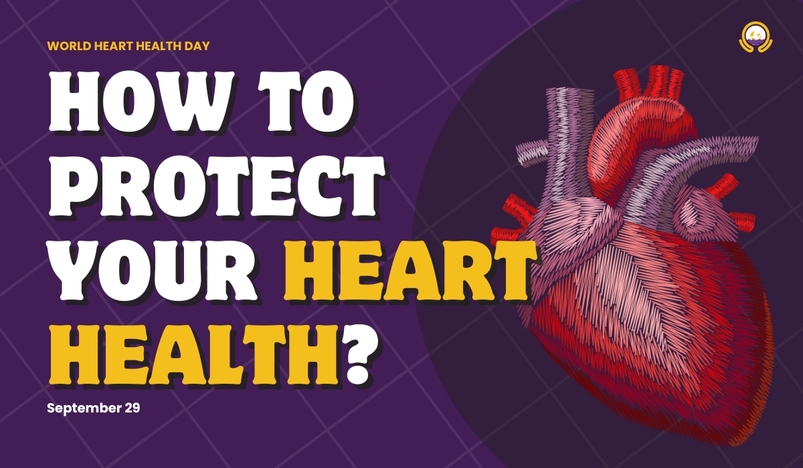How to Protect Your Heart Health?

By
Abinaya Rajagopal - September 30, 2024

Your heart is the engine that powers your body, beating around 100,000 times a day to pump blood, oxygen, and nutrients to every part of you.
But this vital organ needs care and attention to function well throughout your life. With heart disease being one of the leading causes of death worldwide, it’s more important than ever to adopt habits that protect your heart health.
Here's a guide to keeping your heart strong and healthy.
1. Maintain a Heart-Healthy Diet
Your diet has a direct impact on heart health. Consuming foods that are rich in heart-healthy nutrients and low in unhealthy fats is key to supporting cardiovascular health.
- Eat more fruits and vegetables: These are packed with fibre, vitamins, and antioxidants that can reduce the risk of heart disease.
- Opt for whole grains: Whole grains like oats, brown rice, and quinoa can help regulate blood pressure and cholesterol levels.
- Choose healthy fats: Unsaturated fats found in olive oil, nuts, seeds, and avocados are beneficial for the heart. Avoid trans fats and limit saturated fats, which can clog arteries.
- Reduce salt intake: Excess sodium contributes to high blood pressure, increasing the risk of heart disease. Aim to keep your daily sodium intake under 2,300 milligrams (about 1 teaspoon of salt).
- Limit sugar: Too much sugar can lead to weight gain and higher blood pressure. Avoid sugary drinks and processed foods that contain added sugars.
2. Stay Physically Active
Regular physical activity strengthens the heart muscle, improves circulation, and helps maintain a healthy weight. It also reduces the risk of conditions like high blood pressure, diabetes, and high cholesterol, which are major risk factors for heart disease.
- Aim for 150 minutes of moderate exercise per week: Activities like brisk walking, swimming, or cycling can lower your risk of heart disease.
- Incorporate strength training: Lifting weights or doing bodyweight exercises like push-ups twice a week can enhance overall cardiovascular fitness.
- Stay active throughout the day: Simple activities like taking the stairs, walking during breaks, or standing up frequently can help maintain heart health.
3. Keep Stress in Check
Chronic stress can take a toll on your heart. When stressed, your body releases hormones like adrenaline and cortisol, which can increase heart rate and blood pressure. Long-term stress may also encourage unhealthy behaviours such as overeating, smoking, or drinking too much alcohol.
- Practice relaxation techniques: Deep breathing, meditation, or yoga can help reduce stress and keep your heart rate in a healthy range.
- Stay socially connected: Spending time with loved ones or engaging in community activities can provide emotional support and help relieve stress.
- Manage time effectively: Feeling overwhelmed with tasks can increase stress. Prioritize tasks, delegate when possible, and don’t be afraid to say no to unnecessary commitments.
4. Quit Smoking
Smoking is one of the most significant risk factors for heart disease. The chemicals in tobacco can damage blood vessels, reduce oxygen in the blood, and increase the risk of clots, which can lead to heart attacks or strokes.
- Seek support to quit: Counseling, nicotine replacement therapy, and prescription medications can increase your chances of quitting successfully.
- Avoid secondhand smoke: Exposure to secondhand smoke can also damage the heart and blood vessels. Encourage a smoke-free environment at home and work.
5. Limit Alcohol Intake
While moderate alcohol consumption has been linked to some heart benefits, too much alcohol can raise blood pressure, contribute to obesity, and lead to heart failure or arrhythmias.
- Stick to moderate drinking: For women, this means up to one drink per day, and for men, up to two drinks per day.
- Know your limits: If you don’t drink, there’s no need to start for heart benefits. Focus on other heart-healthy habits.
6. Get Enough Sleep
Sleep is essential for overall health, including heart health. Poor sleep or sleep disorders like sleep apnea can increase the risk of heart disease, high blood pressure, and obesity.
- Aim for 7-9 hours of quality sleep per night: Establish a bedtime routine, keep your room dark and cool, and limit screen time before bed.
- Address sleep disorders: If you suspect you have a sleep disorder such as sleep apnea, seek medical advice to manage the condition and protect your heart.
7. Monitor Your Health Regularly
Keeping track of key health metrics can help you stay ahead of potential heart problems.
- Check your blood pressure regularly: High blood pressure (hypertension) can be a silent killer because it often has no symptoms. Regular monitoring can help catch issues early.
- Manage cholesterol levels: High levels of bad cholesterol (LDL) can lead to plaque buildup in the arteries. Regular cholesterol checks will help you know if you need to adjust your diet or take medication.
- Control blood sugar levels: High blood sugar levels can damage blood vessels and nerves that control the heart. If you have diabetes or are at risk, managing your blood sugar levels is crucial for heart health.
8. Maintain a Healthy Weight
Being overweight or obese puts extra strain on your heart and increases your risk of high blood pressure, diabetes, and high cholesterol. Losing even a small amount of weight can improve heart health.
- Set realistic weight loss goals: Aim for a slow and steady weight loss of 1-2 pounds per week through healthy eating and exercise.
- Seek professional guidance: A doctor or nutritionist can help you create a personalized plan to achieve a healthy weight.
Protecting your heart health is a lifelong commitment that involves making smart choices in your daily life.
By eating well, staying active, managing stress, avoiding smoking, and monitoring your health, you can significantly reduce your risk of heart disease and enjoy a longer, healthier life.
Remember, small changes can make a big difference over time, so start incorporating these habits today to keep your heart strong!

By
Abinaya Rajagopal - September 30, 2024

.jpg)
.jpg)


Leave a comment